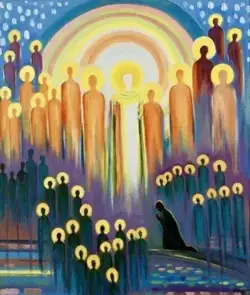 On this day we celebrate the Feast of All Saints, remembering that in Christ Jesus, the Living God unites us to Himself, and so together with all of His children throughout the ages, through the Spirit we are even now being made into a royal priesthood and holy community. This weekend, the Primate of the Anglican Church of Canada, Archbishop Linda Nicholls, has shared a message of hope for Christians (and especially Anglicans) in the midst of our current season of challenges. Please listen to the Primate's message by viewing this video: Our service of Morning Prayer, Bulletin, and Sermon this week can be found here: And our Songs for this week can be found here:
0 Comments
Scripture Readings: Leviticus 19:1–2, 15–18 | Psalm 1 | 1 Thessalonians 2:1–8 | Matthew 22:34–46
“You shall love your neighbour as yourself.” Sounds simple enough, right? Like a pretty logical basis for society. Not to mention a pretty grounded religious way of life. You know, just treat each other well. Be kind. Play nice. If this is all that’s asked of us, we could handle it, right? Now I’m not sure if you’re aware of this, but our neighbours South of the boarder, the United States of America, are about to hold an election. For what seems like forever, we have been hearing all about how much is at stake in their political competition, and just how divided their country is today. Torn between powerful factions locked in bitter rivalry, each vying for power by pitting their people against the ‘other side’. Wild claims and accusations are being bandied about, making it harder and harder for the people to know what is really going on in their own communities… eroding their ability to trust in those around them. Aggression, intimidation, violence, and hate… all aimed at each other… at their fellow Americans. This is not their whole story, of course. Not everyone there is caught up in this wave of division, but it sure seems many are finding it hard these days to ‘be kind’ and ‘play nice’. Of course, we have plenty of problems a lot closer to home too; examples of where ‘loving our neighbours’ is brutal on this side of the boarder. Take a minute to think about some of the issues in our communities that could easily make us turn on each other… to turn our backs on each other. What about the intimidation and destruction happening in Nova Scotia, as Indigenous fishermen face violent anger from those upset by their treaty rights? What about the political and cultural tensions in our own Province? What about the clashes that split up Churches, or workplaces, or homes? No matter who we are, or what community we belong to, loving our neighbours is hard. It can be really, really hard! We may try our best to be nice, at least most of the time… but sharing our life with other people, with real, flesh and blood neighbours, is truly challenging. Good for us, a gift to us, but challenging nonetheless. This has been true since the beginning. All throughout our human story, we people have consistently struggled to love our neighbours well. We can see this, even in Jesus’ day. In our reading from Matthew this morning we jump right into a controversy: into a community deeply divided by bitter rivalries. Our Gospel reading itself mentions two of the factions that were themselves vying for influence and power at that time in Jerusalem: the Pharisees, and the Sadducees. These two factions of Judaism did not see eye to eye. Though both claimed to be faithful to the Law God had given through Moses, they had very different visions of what God wanted of them. The Pharisees were very strict about obeying the Law, and also the religious traditions handed down by the elders, often going beyond what the Law itself required, striving hard to keep themselves as pure as possible. They followed both the Pentateuch, the first five books of the Bible, as well as the rest of what we call the Old Testament. They believed in angels, spirits, and the resurrection of the righteous, and were fairly popular among the common people. The Sadducees, on the other hand, were more in favour with the ruling elites of the day. They did not believe in the spiritual realm, or in any form of resurrection. They focused mostly on the first five books of the Bible, and seemed to have had a less strict approach to following the Law. Both of these two groups were competing for the hearts of their neighbours… for the influence and power that comes with being seen as the spiritual authority. Like many rival parties in our own time and day, both the Pharisees and Sadducees wanted to be in control. In control of their community’s vision, and hopes, and future. And so it’s no surprise that they both saw Jesus of Nazareth as a threat. Despite their own differences, they saw Jesus and His project as a serious problem that needed to be stopped. Our reading today, from the Gospel of Matthew is taken from the end of Chapter 22. But to understand what’s going on in this exchange, we should go back a bit to the beginning of Chapter 21… to the moment Jesus rides into Jerusalem, and upsets everything. First, He rides into the city surrounded by a massive crowd who were waving palms and calling Him the ‘Son of David’… a title for the Messiah, God’s chosen royal rescuer. Next, He rides right to the Temple, to the most sacred place on earth, and starts cleaning house, and calling out the corruption that He sees. Matthew 21:13 “He said to them, “It is written, ‘My house shall be called a house of prayer’; but you are making it a den of robbers.”” Jesus was messing around with both the political and spiritual status quo… in many ways He comes to Jerusalem to pick a fight. And so, all sorts of factions start trying to stop Him. To question His right to say and do all these divisive things. And the rest of Matthew 21 and 22 moves through this building conflict, as again and again, Jesus is challenged, and yet comes out on top. Every group that was vying for influence in Jerusalem, the Chief priests and Elders, the Pharisees, the Sadducees, and Herodians[1], all try to undermine Jesus, to cut Him down to size. But Jesus keeps on tripping them up, and calls out their hypocrisy. Publicly exposing the fact that despite their pious appearances, they were play-acting with God and His people… they were not faithfully following the ways of the LORD. Then in today’s reading, which comes in the middle of this extended confrontation, Jesus responds to a final question, meant to test and trip Him up: When asked what is the single greatest commandment in the Law, Jesus responds with two: You shall love the Lord your God with all your heart, and with all your soul, and with all your mind.’ This is the greatest and first commandment. And a second is like it: ‘You shall love your neighbor as yourself.’ On these two commandments hang all the law and the prophets.” Love the LORD, love your neighbour. Simple enough, right?. Only… One question we might be tempted to ask is: How was Jesus loving His neighbours in Jerusalem? Knowing full well how disruptive His words and actions would be, Jesus repeatedly, and publicly, called out, not just the policies of these leaders, but their character as well. What about this extended conflict seemed all that kind or nice? If Jesus thinks loving our neighbours is so important, why would He be so harsh? What is going on here? What is Jesus doing? As strange as it sounds, I think He is showing us what loving our neighbours really looks like. But to explain why, let’s turn back to our reading from Leviticus, a book meant to help Israel live as God’s own holy people. Located right after Exodus in the story of the Bible, the book of Leviticus, John Sailhamer maintains, “intends to show how Israel was to fulfill its covenant responsibility to be ‘a kingdom of priests and a holy nation’”[2] set apart to reflect God’s character and goodness out into the world. They were to have their whole lives shaped after and transformed by God’s own life; they were to be holy, for the LORD their God is holy. Just from our passage this morning, we are given a glimpse of how God called His people to live: upholding justice, regardless of someone’s status or wealth; not being slanderous, but instead speaking the truth; not profiting from someone’s bloodshed, or filling your heart with hate… but being willing to correct and reprove others when necessary. Never seeking vengeance, or bearing a grudge, but instead loving your neighbour as yourself. For God, loving our neighbour is not simply being kind or playing nice. It always entails protecting the vulnerable, defending truth, and what is right, not giving in to our destructive impulses when we are hurt… not dehumanizing our neighbours, but rather, doing our best to protect them. Sometimes this means saying ‘no’. Sometimes love leads to conflict, or challenging the status quo, not simply to cause division, but to set things right again. In calling out the hypocrisy of Jerusalem’s divisive leaders, Jesus was embodying the holy love of God: As the Messiah, God’s Chosen One, sent to rescue His people, Jesus was refusing to ignore the deadly games they were playing (not only with their own lives, but with their neighbours’ lives as well), and He was calling them to turn around and go another way. To follow Him, and find in Him the holy love of God: to learn from Him how to love the LORD, and love their neighbours. As we know, most of these leaders did not turn from their destructive path. They rejected Jesus, plotted and schemed to have Him crucified. And as we know, this too is how Jesus offers them God’s love: dying for them, and for us all, as the ultimate act of love… laying down His own sinless life to forgive and rescue sinners, and rising again to share with us God’s holy love forever. As we seek to follow Jesus in the year 2020, we too are called to love our neighbours, with God’s own holy love. But in order to love like God does, we need our eyes to be fixed on Jesus: to trust in Him, and receive from Him God’s gift of holy love poured out for us all on the cross, where our hypocrisy and sin is exposed, and where we’re graciously forgiven, and invited to be God’s holy people, reflecting His goodness out into our world: Standing up for the vulnerable, speaking and acting truthfully, not giving in to hated and fear, but striving for the good of all. May we not settle for simply being kind, and playing nice. With the Spirit’s help, let us share God’s life-giving, holy love with our neighbours. Living each day, as those shaped by the Good News of Jesus Christ. Amen. [1] Herodians were Jews that were politically allied with the Roman appointed ruler or Judea, Herod Antipas. The Herodians were not on friendly terms with the Pharisees in particular, but in Matt. 22:15-16 we see them cooperating to try and trap Jesus. [2] John Sailhamer, The Pentateuch as Narrative (Grand Rapids, MI: Zondervan Publishing House, 1992), 323. This week we are reminded of God's commandment to "love your neighbour as yourself". To explore a bit more of the biblical understanding of love, here is another great video from the Bible Project. Our service of Morning Prayer, Bulletin, and Sermon this week can be found here: And our Songs for this week can be found here:
Scripture Readings: Exodus 33:12–23 | Psalm 99 | 1 Thessalonians 1:1–10 | Matthew 22:15–22
Moses said, “Show me your glory, I pray.” Today we wrap up our exploration of the book of Exodus. Over the last several weeks, the lectionary readings have led us through some of the highlights of this important arc in the much larger story of God. In this book, we have been invited to see a new vision of Yahweh, the Living God: not only as the Almighty Creator, but as the Merciful Rescuer… coming to set Israel free from slavery and cruel oppression. And not only that, but also to guide them safely through the desert and into the Promised Land… proving Himself again and again, to be their Faithful Provider. And over the last two weeks we heard how God brings them to Mt. Sinai, and invites Israel into a sacred relationship… a covenant… to be His chosen partners in His work to rescue the world. But last week we heard that at the very moment this sacred partnership was to begin, the people of Israel break their promise, and go back on their vows to the LORD. They form for themselves out of gold an idol, an image of a calf… and they bow down to it in worship, turning their backs on the glory of God. At this crucial moment, God listens to the prayers of mercy from Moses, and so He does not give up on Israel, which would have destroyed them. So Moses goes down to the people, destroys the calf, and stops their false worship, even going so far as to slay those who refused to repent and turn back to the LORD. Then Moses goes up the mountain again to plead for mercy for the people. To ask the LORD to rescue their shattered relationship. The Old Testament scholar, John Sailhamer sums up the situation well: “Israel’s relationship with God had been fundamentally affected by their ‘great sin’ of worshipping the golden calf. All was not the same. The narrative shows that there was now a growing distance between God and Israel that had not been there before.”[1] In Exodus 33:2-3, just before our reading today, we can hear how God intends to respond to His people’s rebellion: “I will send an angel before you, and I will drive out the Canaanites, the Amorites, the Hittites, the Perizzites, the Hivites, and the Jebusites. Go up to a land flowing with milk and honey; but I will not go up among you, or I would consume you on the way, for you are a stiff-necked people.” Thanks to the prayers of Moses, Israel would not be totally abandoned by God. The LORD would fulfill His promises and be completely faithful, graciously blessing this stiff-necked people in ways they simply did not deserve. God would make sure Israel would finally be brought to the Promised Land. But this in itself was not what the LORD had always wanted for them… that was only a glimpse, a taste of His deepest desires for them. Way back in Exodus chapter 6, while they were still oppressed in Egypt, the LORD had shared with Moses what this whole rescue mission was about: Exodus 6:5-8, “I have also heard the groaning of the Israelites whom the Egyptians are holding as slaves, and I have remembered my covenant. [That is, God’s promises to Abraham, Isaac, and Jacob] Say therefore to the Israelites, ‘I am the Lord, and I will free you from the burdens of the Egyptians and deliver you from slavery to them. I will redeem you with an outstretched arm and with mighty acts of judgment. I will take you as my people, and I will be your God. You shall know that I am the Lord your God, who has freed you from the burdens of the Egyptians. I will bring you into the land that I swore to give to Abraham, Isaac, and Jacob; I will give it to you for a possession. I am the Lord.’ “I will take you as my people, and I will be your God. You shall know that I am the Lord your God”. God wants more than to simply bless Israel… God wants to belong to them… He wants them to be His people… to be truly known by them. To be their Merciful Rescuer, to be their Faithful Provider. God wanted to share His divine life with this people forever. But after the Golden Calf, it is clear that Israel has other plans. They want to serve less demanding lords; gods of their own making, ones that they could use to help them get the things they wanted. That is what idolatry is after all: refusing to acknowledge and serve the Living God, and instead to try and manipulate divine power to grab hold of something else. To use the divine for some other purpose. It can be easy for us to fall into this temptation as well… to seek what God can give us, instead of seeking God Himself. To pursue all of the spiritual, psychological, and social blessings that come with our religion… but never to search for the face of the LORD. Yes, we may not make a golden calf for ourselves… but are there ways we too distort our relationship with God? Using Him to try to get what we want, even unconsciously? For example: Is our ultimate goal simply to get through the wilderness and into the Promised Land? For many years, the Gospel has almost been reduced to sacred fire insurance. Is our commitment to God simply about getting to heaven one day? Doing whatever it takes to avoid punishment or hell? Or is our goal to feel better? Do we use God just to help us face our struggles? To find peace, joy, forgiveness, purpose, and hope for ourselves? Are we serving God simply for the emotional benefits? Or is our goal to find community: to feel like we belong? To hang out with likeminded people, or to avoid loneliness? Are all of these desires and more at work within us? If I am being completely honest, they are all at work in me. And what’s more, there’s absolutely nothing wrong with any of these things! They are all good aspects of God’s blessings that are intended for His people… they’re all part of His plan for them, and for the world. Just like there was nothing wrong with the Israelites having gold, but it was wrong for them to take that gold and make it into a god… to serve it and centre their life around it… in the same way there are so many gifts God offers to those who follow Him that in themselves are good, but that will distort our truest purpose if we build our lives around them. Imagine marrying someone, not because you want to share your life with them… to grow in intimacy, understanding, and mutual love… but just for their house? Or because they say nice things to you. Or because you like to spend time with their social circle? All these things can be a part of sharing your life with someone, but what matters most is the bond, the connection, the love that is shared. Like Israel, God does not simply want to bless us, but to belong to us, and for us to belong to Him. He wants to be our God, and for us all to truly be His people… to share in His divine life. To know Him intimately, and to respond to Him in love. Back on Mt. Sinai, God tells Moses He will not abandon Israel in the wilderness to die. He will faithfully fulfill His promises to them and to their ancestors… but His presence will not be going with them. They will receive much more then they deserved, but they will have missed the greatest gift of all: an ongoing relationship with the Living God… to know the LORD their Saviour with intimacy and love… to truly belong to God, and belong with God forever. Standing alone in faith before the LORD, Moses intercedes again… he pleads for God not simply to bless the people… or to be faithful to His promises… but to go with them… to stay with them… to always be with them. To not give up on being Israel’s God, and for them to be His people. And amazingly God says yes again! God will go with His people. Though their relationship would be rocky, as the people kept falling back into fear and sin, God would share His divine life with them. Moses’ prayer was answered. Then something incredible takes place: Moses goes a huge step further. “Let me see your glory!” He prays. “Let me see your glory.” Moses, who alone in biblical story so far, had experienced an amazingly intimate knowledge of the Living God, wants even more. Moses wants as much of the LORD Himself as humanly possible… he’s not seeking what God could give to him… He’s not using God to get something else. No, Moses wants to know the LORD, to follow in God’s ways… to share as fully as possible in God’s holy life. Here we see Moses embodying what the third century Church Father, St. Gregory of Nyssa, called having the true vision of God: “never to be satisfied in the desire to see him.”[2] And again, God answers Moses’ prayer: revealing Himself to him… giving to Moses a powerful glimpse of His goodness and glory. This was a deeply personal blessing and gift, a life-changing encounter, not simply for his own benefit, but so that all of Israel might come to a deeper knowledge and love of the LORD as well. Through Moses’ seeking the face of God all of Israel was given a way forward to be God’s people… to truly belong to Him. In Jesus Christ the Living God offers this same gift to us. As the Eternal Son of God Christ reveals God’s true face to the world… that He is our Merciful Rescuer, and Faithful Provider. That His desire is still for all of humanity, as stiff-necked and sinful as we are, to truly belong with Him. For Him to be our God, and for us to be His people. To share in His divine life, both now and forever. Jesus stood alone on our behalf to reconcile us to God. To live among us as God’s faithful covenant partner, and in His death on the cross to deal with all our sin once and for all: repairing our relationship with the Living God, that united to Him in faith, we can be with our Saviour forever. There are many gifts that come with sharing in God’s own divine life, but the greatest gift He offers us is the gift of Himself… that in Jesus Christ we all are invited to truly know and love the LORD… to belong to Him, and belong with Him all of our days. So let us receive everything that our Saviour desires for us, and above all else may we seek to draw near to Jesus: who is the face, the goodness, and the glory of God. Amen. [1] John H. Sailhamer, The Pentateuch as Narrative (Grand Rapids, MI: Zondervan Publishing House, 1992), 313. [2] Gregory of Nyssa, The Life of Moses, trans. by Abraham Malherbe & Everett Ferguson (New York: Paulist Press, 1978), 116. Today is the Feast of our Patron Saint, Luke the Evangelist. "Luke is mentioned three times in the Letters of Saint Paul, once as “the beloved physician,” but the Church remembers him chiefly as the author of two books which came to be included in the New Testament. The first book is the one we know as the Gospel according to Luke, where he told the story of Jesus, his preaching and mighty work in the border-country of Galilee, his suffering, death and resurrection at the very heart of Israel, in Jerusalem itself. The second of Luke’s two books is the Acts of the Apostles. In this work he told how the good news was spread: how the apostles began their preaching at Jerusalem and moved westwards with the gospel until they reached the very centre of the Roman empire, the city of Rome itself. Thus, in these two books, Luke presented a comprehensive history of the gospel in terms of a journey from the hinterland of Judea to the heartland of imperial power and civilization. We offer thanks to God for bestowing such gifts of understanding and literary skill on Luke, and we celebrate Luke himself because he responded so faithfully to the working of grace. But still, we remember the story-teller for the story that he told; and that story is the Lord’s story. So, on this his day, we can honour Saint Luke no more highly than by joining in the telling of that story, which God gave him power to give us; that story which is the praise of God through Jesus Christ in the Holy Spirit." -Taken from For All The Saints: Prayers and Readings for Saints’ Days, (Toronto: ABC Publishing, 2007), page 310. Even though we are celebrating St. Luke's feast, our readings for this week will still follow the standard lectionary readings, allowing us to continue our journey through the Book of Exodus. Our Service of Morning Prayer, Bulletin, and Sermon for this week can be found here: And our Song for this week can be found here:
Scripture Readings: Exodus 32:1-14 | Psalm 106:1-6, 19-23 | Philippians 4:1–9 | Matthew 22:1–14
What are we thankful for today? We know this Thanksgiving weekend will look a lot different than it has in the past. Big family meals and gatherings are basically a no-go, and so much of our familiar ways of celebrating have had to be re-arranged. Yet even so, we really do have much we can be thankful for. And I hope we all take some time this weekend to reflect on, and share, our sense of gratitude… not only with our words, but with how we choose to live each day. Saying ‘thank you’ is one thing. Being thankful is another. This Fall we have been following the story of Exodus: How the Living God rescued Israel from slavery in Egypt, and led them into a brand-new life as His own chosen people. Last week we heard how God had let them safely to Mt. Sinai, and had graciously given them the Law to guide their life with Him: teaching them how to faithfully love and serve the LORD, and how to love and serve the needs of each other as well. God was giving this group of ex-slaves a key role within His Kingdom, inviting them to take part in His holy, blessed life. And for their part, the people of Israel are all on board. They vigorously say yes to all God asks of them: In Exodus 24 we can hear their response: “Moses came and told the people all the words of the Lord and all the ordinances; and all the people answered with one voice, and said, “All the words that the Lord has spoken we will do.” And Moses wrote down all the words of the Lord… Then he took the book of the covenant, and read it in the hearing of the people; and they said, “All that the Lord has spoken we will do, and we will be obedient,” (Exodus 24:3-4, 7). Twice they promise to do all that the LORD has spoken. To respond to His rescuing love with total faithfulness. So, God takes the Israelites at their word, calling Moses up the Mountain to flesh out all the details of how Almighty God would dwell among His new people. In that meeting, God gives all sorts of instructions to Moses about the building of the Tabernacle: the holy Tent of Meeting where God’s glorious presence would tangibly reside. And also about an order of priests: set aside to serve by offering sacrifices, helping the people to draw close to the LORD, and follow His holy ways. And then the LORD laid out a system of sacred festivals: to celebrate the story of God’s gracious love for His people. In short, God was giving Israel rich and elaborate ways to keep alive and nourish their faith and gratitude, giving shape to their relationship with God, each other, and the nations around them. But as the LORD and Moses discuss what was to be a beautiful new beginning… the Israelites get impatient, and completely go back on their word. They get Aaron, the priest, to create for them a god of their own liking… an idol made of lifeless gold to bow down to in worship. They hold a festival to celebrate this idol, and to give themselves over to wild revelry. Like Adam and Eve in the Garden, Israel was betraying the LORD at the very beginning of their new relationship with Him, poisoning the whole plan God had intended for them. As the scholar John Sailhamer points out: “the incident of the worship of the golden calf cast a dark shadow across Israel’s relationship with God, much the same way as the account of the Fall in Genesis 3 marked a major turning point in God’s dealing with humanity.”[1] This wasn’t just a simple mistake, or a momentary lapse in judgment: the people were spitting in the face of the LORD who rescued them. Some of us know the terrible damage that often comes with betrayal. Broken trust can be extremely hard to repair. And though there are some obvious examples of betrayal we could easily name, unfaithfulness can take all sorts of more subtle shapes and forms. What about taking for granted those we once promised to love? Of neglecting our commitments to those who rely on us? What about chasing after lifeless objects, images, and idols, that claim to offer excitement and joy, but only lead to death? Instead of keeping faith, and treasuring what we have been given in life, we can all be tempted to chase after our own selfish desires. In the face of their betrayal, we hear God’s terrifying response. He says to Moses: ‘I’m done. I’m out. If they’d rather live for and worship that lifeless gold than Me, their Saviour, I’ll give them what they want. I am done with Israel.’ The stakes could not be higher for the Israelites. By themselves, they’d never have left the oppression of Egypt. And by themselves, they didn’t stand a chance in the wilderness. Israel’s only hope lay in God’s ongoing faithfulness. In His rescuing mercy, and life-giving love. And they had just trampled His gracious gift into the dust. Like a bride who runs away with a stranger during the wedding ceremony, Israel almost shattered their story with God as soon as it had begun. But even in this terrifying moment of betrayal, where God threatens to wipe Israel out and start all over again, God also reveals His faithfulness in a surprising way: Brevard Childs points out that, “God vows the severest punishment imaginable, but then suddenly he conditions it, as it were, on Moses’ agreement. ‘Let me alone that I may consume them.’ The effect is that God himself leaves the door open for intercession. He allows himself to be persuaded.” [2] By inviting Moses into a place where he could stand up for Israel, God gave the people an advocate… someone who would have their back. Not because they deserved it, but because the LORD is gracious… and faithful to the end, even when we humans are not. So Moses steps through the door that God opens for him, and he pleads for God to spare Israel and forgive their betrayal. But how he does this matters. As Brevard Childs explains, “Moses does not attempt to excuse or mitigate Israel’s sin, but he seeks to overcome it by falling back ultimately on what God can do in making a future possible.”[3] Though Moses makes his case for the people, he knows that Israel’s only hope is in the steadfastness and mercy that defines the Living God. In the end, it’s God’s own faithfulness that saves Israel. Moses prays that God we be true to Himself, even though His people proved false. And because the LORD is faithful, He listens to Moses’ prayer, and the story of God’s people goes on, though not without some scars. Their ingratitude and faithlessness did not end overnight, and throughout the story of the Bible they would frequently struggle to follow the ways of their Saving LORD. The theologian Peter Leithart points out that this is not simply Israel’s struggle, but the same temptation is there for all who seek to follow the Living God. We are all tempted at times to turn from Him, and giving our hearts to things that lead us far away from His side. “Already at Sinai,” Leithart writes, “we get a preview of Israel’s history of idolatry, image-worship, blasphemy, and Sabbath-breaking. Already at the foot of Sinai, we know we need God’s Word written on our hearts by the finger of the Spirit. We need a mediator better than Moses, one who can demolish the idols of our hearts.”[4] Thankfully, the Living God has given us this better advocate: coming Himself to stand and pray for us in Jesus Christ His Son. Christ as the greatest intercessor taking up the cause of our sinful world, and securing their salvation by laying His own life down for us all. Jesus alone has fulfilled “All that the Lord has spoken”, keeping the Law in total trust and faithfulness to His Heavenly Father. In His death and resurrection, Christ repaired our broken relationship with God, reconciling our rebellious, and ungrateful hearts to be united through Him to our merciful Creator. In Christ, God Himself bears the burden of our betrayal, and in self-giving, faithful love, refuses to abandon His people, but instead to sets us free, no longer to chase after dead idols, but to share in His divine life, with joy and thankfulness. Friends, God’s ongoing faithfulness in Jesus is our hope. From beginning to end, we owe it all to the grace of God. Brevard Childs writes, “Israel and the church have their existence because God picked up the pieces. There was no golden period of unblemished saintliness. Rather, the people of God are from the outset the forgiven and restored community. There is a covenant— and a new covenant—because it was maintained from God’s side. If there ever was a danger of understanding Sinai as a pact between partners, the rupture of the golden calf made crystal clear that the foundation of the covenant was, above all, divine mercy and forgiveness.”[5] As we commemorate the story of God’s gracious love for His people, celebrating what Jesus has done for us, by drawing near to His table, may He nourish us through His Holy Spirit and keep alive within us hearts filled with gratitude and trust that shape the way we live, with God, with each other, and with everyone around us. Happy Thanksgiving, let us thank God for His faithfulness. Amen. [1] John H. Sailhamer, The Pentateuch as Narrative (Grand Rapids, MI: Zondervan Publishing House, 1992), 310. [2] Brevard S. Childs, The Book of Exodus: A Critical, Theological Commentary, ed. Peter Ackroyd et al., The Old Testament Library (Louisville, KY: Westminster John Knox Press, 2004), 567. [3] Brevard S. Childs, The Book of Exodus: A Critical, Theological Commentary, ed. Peter Ackroyd et al., The Old Testament Library (Louisville, KY: Westminster John Knox Press, 2004), 568. [4] Peter J. Leithart, The Ten Commandments: A Guide to the Perfect Law of Liberty, Christian Essentials (Bellingham, WA: Lexham Press, 2020), 28. [5] Brevard S. Childs, The Book of Exodus: A Critical, Theological Commentary, ed. Peter Ackroyd et al., The Old Testament Library (Louisville, KY: Westminster John Knox Press, 2004), 580. Happy Thanksgiving everyone! Even though this holiday will look very different for many of us this year, we still have much to be grateful for, especially when we consider all the LORD has done for us. In our service this week we continue our journey through the book of Exodus, and find there one of the absolute worst failures of God's people, and an incredibly gracious gift from God as well. For another close look at the gracious character of God, check out this short video from the folks at the Bible Project: Our service of Morning Prayer, Bulletin, and Sermon this week can be found here: And our Songs this week (including our All-Ages Song) can be found here:
Scripture Readings: Exodus 20:1–4, 7–9, 12–20 | Psalm 19 | Philippians 3:4b–14 | Matthew 21:33–46
“Then God spoke all these words: I am the Lord your God, who brought you out of the land of Egypt, out of the house of slavery…” We have been given a lot of new rules and guidelines to follow these past seven months… helping us try to navigate this new world COVID-19 has brought to us. Here in New Brunswick, our Provincial government and medical experts did their best to communicate the seriousness of this new threat we were facing… and thankfully, most of us trusted them enough to follow their lead. Although back in the Spring no one really liked the idea of shutting down the economy, of closing schools, wearing masks, and isolating at home… we were told these would be the best ways to protect ourselves, and those around us. And though today we know that our country and world still has a long path ahead before this pandemic is over, these guidelines and rules have played a big part in helping us to move forward. Our journey through the book of Exodus this fall has brought us from the banks of the Nile River, to the foot of Mt. Sinai… to the moment when the Living God meets with Israel His people and gives to them a brand new way of living in this world. Just before our reading today, in Exodus chapter 19, the stage is set for Israel to receive this gracious gift. (Exodus 19:3-6): Then Moses went up to God; the Lord called to him from the mountain, saying, “Thus you shall say to the house of Jacob, and tell the Israelites: You have seen what I did to the Egyptians, and how I bore you on eagles’ wings and brought you to myself. Now therefore, if you obey my voice and keep my covenant, you shall be my treasured possession out of all the peoples. Indeed, the whole earth is mine, but you shall be for me a priestly kingdom and a holy nation. These are the words that you shall speak to the Israelites.” From this company of ex-slaves, God was going to make something new: a priestly kingdom, a holy nation, a people set apart to reflect the character and saving grace of God out into the world… to become His own treasured possession by trusting in Him. Obeying the LORD’s voice, keeping His covenant, and walking in His ways was to be the path forward for Israel to share in the new life of God. Here at Mt. Sinai, the Living God was entering into a covenant with Israel; a sacred relationship defined by faithfulness, and upheld by rules, by clear expectations of what the relationship required. In many ways, it’s like a marriage between God and Israel: solemn vows were made about the shape of their future life together. And so, the LORD spells out for Israel what it looks like to be His people. As the scholar Brevard Childs points out, these rules were not simply pulled out of nowhere, “[r]ather, they reflected the essential character of God himself.”[1] So to empower them to reflect God’s own goodness and character into the world, God gives them the Law, most notably the portion we read this morning: in Hebrew, their called the “Ten Words”, or as we know them, the Ten Commandments. Many of us know these words well… they have been treasured for generations… but the story of when and why they were given can easily fade into the background, which, unfortunately, can make it easy to misunderstand their purpose. But they were not handed down from heaven as timeless truths meant to stand on their own… or as bits of spiritual advice for those looking to better themselves. No, these words, these commandments, play a part in the bigger story of God’s great rescue mission, as the LORD of all the earth seeks to save His captive creatures. Taken all by themselves, it can seem like God’s just given us a checklist for how to get in His good books… for how you and I can earn His approval. But if we are following the story of Exodus and the Bible so far, we can see that the people of Israel were already in God’s good books! He has already stepped in to save them, in pretty dramatic ways, not because they were awesome, or perfect, or good, but out of compassion and mercy. In fact, up to this point, Israel had more often been a pain in the neck… stubbornly doubting God’s faithfulness at every bump in the road. Yet still, God desired to give Himself to this people, to share His holy life with them, and through them, with the world. This covenant relationship, and the Law that came with it, were God’s gracious gifts to a community of messed up people that could not earn or deserve it… but they could receive it, and believe in the One who was giving it. With His help, they could become a people who truly shared in God’s new life. The LORD did not lay down the Law so Israel could make themselves worthy of His love… No, the LORD first loved Israel, as messed up as they were, and so He gave them the Law to draw them even closer. We don’t often think of rules and commandments as gifts, but through them God was at work bringing about His rescue mission: first for Israel, and then through them, for everyone. Through the Law, God was requiring the Israelites to trust Him with their lives… with how they existed in their communities, their families, and their hearts. These Laws were given to protect and preserve the wellbeing of everyone; as individuals, and as a wider society. Shaping their life together were rules defending the weak from the strong, guiding everyone together into the good future God had in store for them. At the heart of the Law was wholehearted devotion to the Living God, and along with that came the commitment to defend and honour each other. In other words, the people were to love God, and to love their neighbours. Though there were many other laws and commandments given at Sinai, these ten serve as a central core which the others connect to. But one could ask this morning, how do they connect with us today? Where do the Ten Commandments fit into where we are now in the Christian story? In the story of God’s rescue mission in the light of Jesus Christ? Over the years, there have been may ways Christians have tried to answer this question… some much more successfully, and faithfully than others. Some see them as the core of what it means to obey God… as if the Christian life was basically about following these Laws. Others seem them as obsolete, as no longer needed, just some ancient relics from the past, that we should do away with. Thankfully, the Bible, especially the New Testament, has much to say about the Law, and about the role it plays in God’s ongoing mission to save the world. And it offers us another perspective on how Christians connect to the Law: one which, not surprisingly, points us to Jesus. For Christians, the Law remains a treasured part of our story, for the same LORD who rescued Israel, and gave them the Law at Sinai, gave Himself to the world through Jesus Christ to rescue us all at the cross. The Law played an essential role in preparing the people of God for the coming of God’s Messiah, guiding them towards this brand-new reality that the LORD always had in the works… that is, to reconcile and reunite His lost and lawless world to Himself through the life, death, and resurrection of the Eternal Son of God. Brevard Childs again points out that “[t]he intent of the commandments is to engender love of God and love of neighbor.” [2] Christ came to fulfill the commandments, to do what even Israel could not: to completely embody the character and goodness of God, to be utterly devoted to the will of His Father in Heaven, and in self-giving love, to lay down His life to rescue sinners… to set them free to receive the gift of God’s own Holy Spirit, so that they too can share in God’s new life, now and forever. For Christians, the commandments point us onward to Jesus Christ: to the one who is Himself the saving love of God in the flesh. They draw us towards a deeper devotion to Him, and trust in His love for us, so that through His Spirit within us, we can share God’s love with our neighbours. Our relationship with God is not based on obeying the Law, but on Jesus Christ, and on what He has done to rescue us. The Ten Commandments, give us a taste of God’s faithful love, inviting us to trust Him, with the whole scope of our entire lives. So may we receive them as God’s gift to us, preparing us to take part in God’s new life through Jesus His Son, and empowering us through His Spirit to play our part in His story: reflecting the goodness and saving grace of God out into the world. Amen. [1] Brevard S. Childs, The Book of Exodus: A Critical, Theological Commentary, ed. Peter Ackroyd et al., The Old Testament Library (Louisville, KY: Westminster John Knox Press, 2004), 397. [2] Brevard S. Childs, The Book of Exodus: A Critical, Theological Commentary, ed. Peter Ackroyd et al., The Old Testament Library (Louisville, KY: Westminster John Knox Press, 2004), 439. ville, KY: Westminster John Knox Press, 2004), 439. 10 Commands
(Chorus) I Am the LORD God Almighty Who rescued you From slavery These 10 Commands Will help you be My children who Have been set free (Verse 1) You must have no other gods beside Me Don't make idols Don't misuse My name Rest on the sabbath day (Chorus) (Verse 2) Be sure to honour your parents, do not kill Don't commit adultery Do not steal or lie Don't chase after what others have (Chorus) This week we reflect on God's gift of the Ten Commandments to Israel, and how this gift fits into the wider story of God's rescuing love. Our service of Morning Prayer, Bulletin, and Sermon this week can be found here: And our Songs for this week, including our All-Ages Song, can be found here:
|
Rev. RObRev. Rob serves as the Priest-in-Charge at St. Luke's Gondola Point, and as the School Chaplain at Rothesay Netherwood School Archives
June 2024
Categories
All
|
|
5 Quispamsis Road, Quispamsis NB, E2E 1M2
Mail to: 12 Quispamsis Road, Quispamsis NB E2E 1M2 |
Contact Us
Parish Phone: 506-847-3670 | www.stlukesgp.ca | www.facebook.com/StLukesGP/ Rev. Rob: 506-608-1772 | [email protected] |
Proudly powered by Weebly

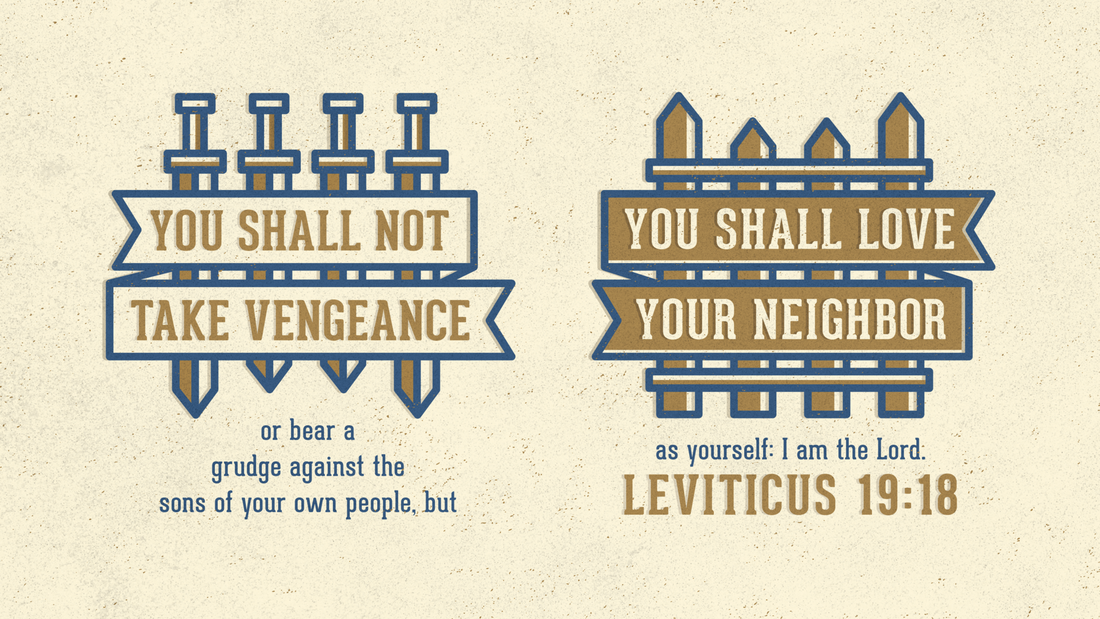

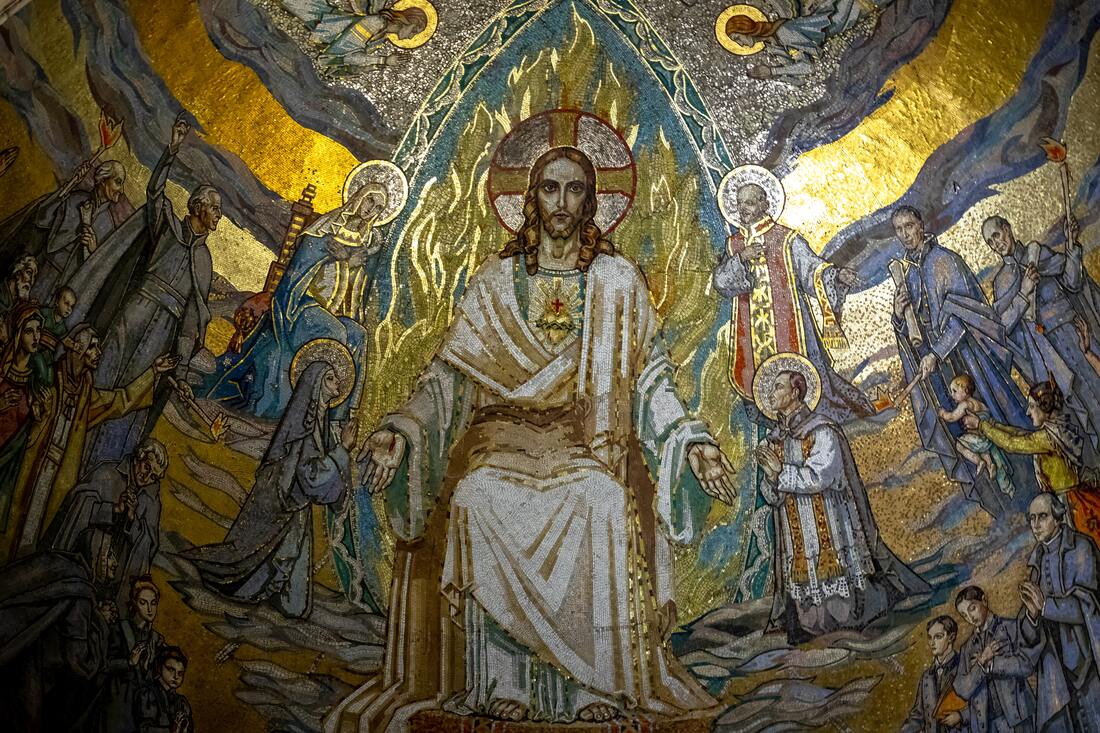
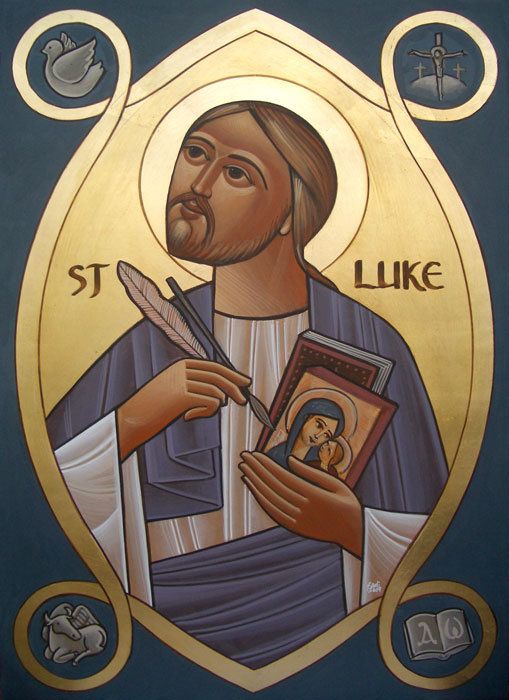

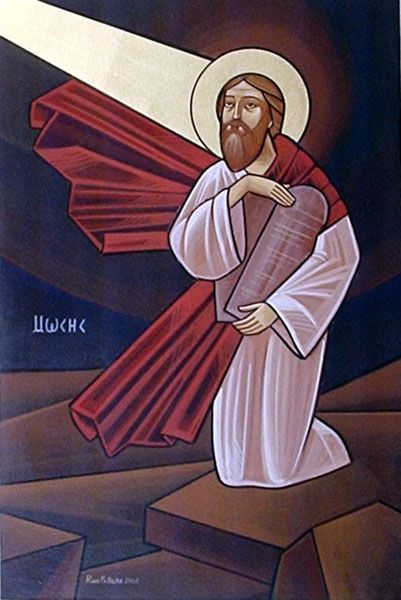
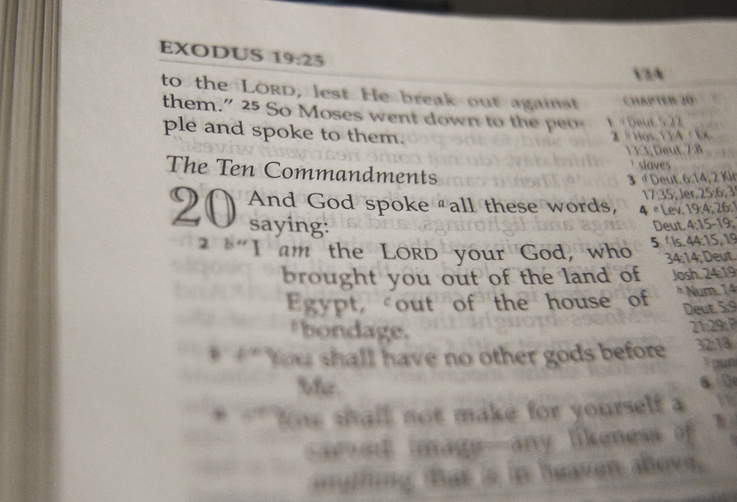
 RSS Feed
RSS Feed
